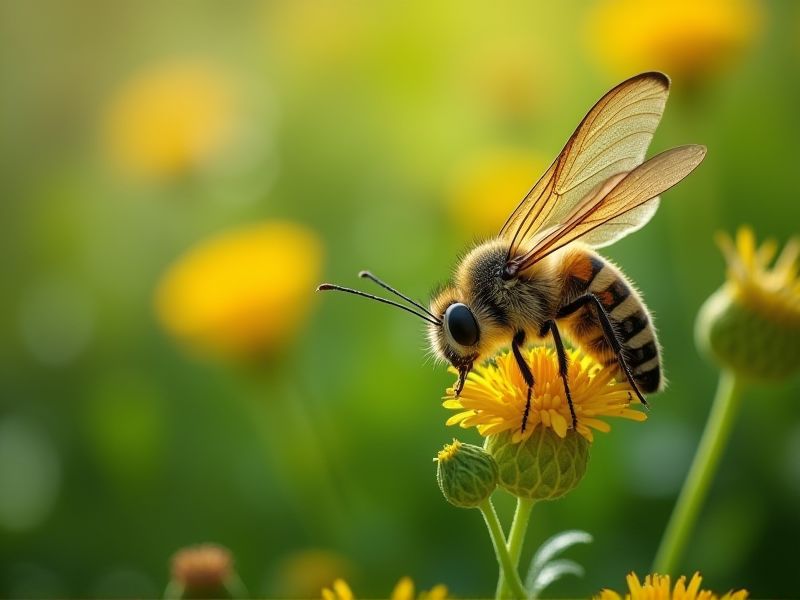
Certain low-maintenance plants can serve as effective insect repellents while adding beauty to your garden. Marigolds, with their vibrant colors, release a natural chemical that deters aphids, nematodes, and whiteflies, making them ideal companions for vegetables. Lavender not only attracts pollinators but also repels mosquitoes and moths, providing a fragrant addition to your space. Rosemary, a hardy herb that requires little care, is known to repel pesky insects such as mosquitoes and flies. Incorporating these plants into your landscape can create a pest-free environment while enhancing your outdoor aesthetics.
List of some Low-maintenance plants that repel insects
- Lavender (Lavandula)
- Marigold (Tagetes)
- Rosemary (Rosmarinus officinalis)
- Citronella Grass (Cymbopogon nardus)
- Basil (Ocimum basilicum)
- Mint (Mentha)
- Catnip (Nepeta cataria)
- Lemon Balm (Melissa officinalis)
- Sage (Salvia officinalis)
- Eucalyptus (Eucalyptus)
Important things about Low-maintenance plants that repel insects
Natural Pest Deterrents
Low-maintenance plants, such as lavender, rosemary, and marigold, can effectively repel insects while enhancing your garden's aesthetic. Lavender emits a strong aroma that deters mosquitoes and flies, making it ideal for outdoor spaces. Rosemary not only serves as a culinary herb but also produces oils that repel beetles and moths. Incorporating marigolds into your garden can help keep nematodes and aphids at bay, providing natural pest control without the need for harsh chemicals.
Drought Resistance
Low-maintenance plants that exhibit drought resistance and repel insects are essential for creating sustainable gardens. Varieties such as lavender, rosemary, and sage not only thrive in arid conditions but also deter pests like mosquitoes and flies with their aromatic oils. Incorporating native plants, such as cone flower and yarrow, adds resilience to your landscape while attracting beneficial insects. By selecting these hardy species, you ensure a vibrant garden that conserves water and minimizes the need for chemical insecticides.
Easy Care Requirements
Low-maintenance plants that naturally repel insects offer practical solutions for your garden while minimizing upkeep. Marigolds, for instance, contain compounds that deter aphids and mosquitoes, thriving in various soil types with minimal watering. Lavender not only adds a fragrant touch but also effectively repels flies and moths, flourishing in well-drained soil and sunny locations. Incorporating herbs like basil and mint can create a beautiful, edible landscape while keeping pests at bay, as their aromatic oils discourage unwanted insects.
Attractive Foliage And Flowers
Low-maintenance plants like marigolds and lavender not only enhance your garden's aesthetic with vibrant foliage and beautiful flowers but also serve as natural insect repellents. Marigolds, with their bright orange and yellow blooms, emit a scent that deters pests such as aphids and nematodes. Lavender, known for its stunning purple flowers and soothing fragrance, can effectively repel mosquitoes and moths while attracting beneficial pollinators. By incorporating these plants into your landscape, you create an appealing outdoor space that minimizes the need for chemical pesticides.
Native Plant Benefits
Native plants require minimal maintenance and are well-adapted to local climates and soils, making them an excellent choice for sustainable gardening. Many native species, such as lavender and citronella grass, naturally repel insects, providing a chemical-free alternative to pesticides. By incorporating these plants into your landscape, you not only reduce the need for harmful chemicals but also support local wildlife, including pollinators. Choosing low-maintenance native plants enhances your garden's resilience while promoting ecological balance and reducing your environmental impact.
Aromatic Properties
Low-maintenance plants with aromatic properties can be highly effective in repelling insects while adding beauty to your garden. For example, lavender emits a soothing fragrance that not only attracts pollinators but also deters mosquitoes and moths. Similarly, rosemary's robust scent is known to repel various pests, making it an excellent choice for garden borders or containers. Plant these aromatic herbs in your outdoor space to enhance your environment and reduce the need for chemical bug repellents.
Biodiversity Support
Low-maintenance plants such as lavender, marigolds, and citronella grass not only enhance your garden's aesthetic but also play a crucial role in supporting biodiversity by naturally repelling insects. Lavender emits a fragrant oil that deters pests like mosquitoes and moths, making it an ideal choice for both beauty and functionality. Marigolds contain compounds that repel nematodes and other harmful insects, promoting a healthier ecosystem in your garden. By incorporating these plants, you can create a thriving environment that encourages beneficial pollinators while minimizing insect infestations.
Seasonal Interest
Low-maintenance plants that repel insects are ideal for anyone seeking a natural way to keep pests at bay while enhancing their garden's beauty. Lavender, citronella grass, and marigolds are excellent choices; their fragrances deter mosquitoes and other nuisance insects. Additionally, planting sage and rosemary not only requires minimal care but also provides culinary benefits, enriching your dishes with fresh herbs. By incorporating these resilient plants into your landscape, you can enjoy a picturesque garden that reduces the need for chemical repellents and fosters a healthy outdoor environment.
Soil Adaptability
Low-maintenance plants that naturally repel insects are ideal for enhancing your garden's resilience while minimizing upkeep. Examples include lavender, with its aromatic oils that deter mosquitoes and moths, and marigolds, which effectively ward off aphids and nematodes. These plants thrive in various soil types, making them suitable for diverse environments, from sandy to clay-rich soils. By incorporating these insect-repelling varieties, you not only reduce the need for chemical pesticides but also create a vibrant ecosystem that supports beneficial insects.
Eco-Friendly Gardening
Low-maintenance plants such as lavender, marigold, and citronella grass serve as effective natural insect repellents while enhancing your garden's aesthetic appeal. These plants not only require minimal care, thriving in various conditions, but also emit scents that deter pests like mosquitoes and aphids. Incorporating these eco-friendly options can create a harmonious garden environment, reducing the need for harmful pesticides. By choosing such resilient flora, you not only enjoy a beautiful space but also contribute to sustainable gardening practices that promote biodiversity.
